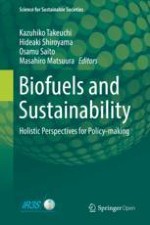9.1 Introduction
9.2 Case from Brazil
9.2.1 Method
Government | Industry | Research and civil society |
|---|---|---|
Ministeiro da Agricultura | Uniao da Industria de Cana-de-Acucar (UNICA) | Universidade de Sao Paulo, Centro de Estudos Avancados em Economia Aplicada |
Empresa Brasileira de Pesquisa Agropecuária (EMBRAPA) | Associacao Brasileira de Agribusiness (abag) | Economia & Energia (NGO) |
Ministeiro de Ciencia e Tecnologia | PetroBras | ONG Vitae Civilis (NGO) |
Banco Nacional de Desenvovimento Economico e Social (BNDES) | DEDINI | |
Mitsui company in Brazil |
